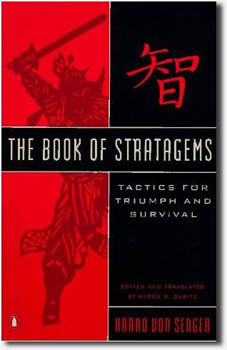
Professor Harro von Senger, a leading Sinologist with the Swiss Institute of Comparative Law in Lausanne, recently held a press conference to announce the publication of the Chinese version of his book The Book of Stratagems. He is regarded as a leading Western expert on the subject having devoted several decades to the research of Chinese ancient military strategy. Uncertain of his readers' reactions, the professor only wrote about the first 18 'stratagems' in the first volume of his book published in German in Berne in 1992. But it became so popular that it has since been reprinted many times and translated into 12 languages, such as Dutch, Italian, Chinese, English and French. The total print run so far is 500,000.
In 2000, the second volume illustrating the remaining 18 stratagems came out. August 2006, meanwhile, witnessed the return of the ancient Chinese tactics to their home as the complete Chinese manuscript of two volumes was published in China.
At the press conference in Beijing, Professor von Senger impressed the audience with his refined Eastern manners and perfect Chinese. His speech had great sense of humanity and was sprinkled with many delightful idiomatic Chinese expressions.
Love affair with "Chinese stratagems"
Born into an intellectual family in Switzerland, Harro Ven Senger saw Chinese characters for the first time at a family friend's home in 1963. The same year, he was admitted to the Department of Law of Zurich University and later chose the Chinese language as his minor. Although he passed the bar exam in 1971, he found the "China dream" too attractive to give up. So, he left Switzerland for Asia and studied Chinese in Japan, Chinese mainland and Taiwan.
It was pure coincidence that led Harro von Senger to the "36 stratagems." One day, a professor from the Center for Chinese Language and Culture Studies of National Taiwan Normal University, suddenly said to him that, of the 36 stratagems, running away was the best. When von Senger asked him what were the other 35 stratagems, the professor said he didn't know. At that time, von Senger was living in a students' dorm of Taiwan University and he questioned his Chinese roommates on the subject. Two or three days later, a Chinese student gave him a copy of all the names of the 36 stratagems. Several weeks later, when von Senger was at a book market and a Chinese student who was with him picked up one book and said: "This is a book on the 36 stratagems; are you interested?" Thus von Senger purchased his first book on this subject.
He studied in Japan for two years after his two-year stay in Taiwan. Then, between 1975 and 1977, he studied history and philosophy at Peking University. During this period, he gradually understood that the stratagems were not only relevant to ancient times but also formed a modern tactic for analyzing the adversary.
Upon returning to Switzerland, Harro von Senger started to examine the social phenomena in Western society in light of the 36 stratagems. "I noticed that the 36 stratagems are not unique to China; they have universal value and can help to better understand society and human relations. Therefore I selected a large number of Western cases in the first volume of Stratagems in order to globalize this branch of Chinese culture," he said.
Eastern wisdom
The professor has divided consciousness of the stratagems into three levels. The first is zero level, in other words, total ignorance. He quoted the example of Adam and Eve, saying: "Of all the animals, the snake is the trickiest. Since Adam and Eve didn't have any consciousness of the trickery involved, they fell into the snake's trap. The outraged God drove them out of Paradise. A recent Western theory posed the question whether Adam and Eve could be Chinese. My answer is no. If they were Chinese, they would not have been trapped by the snake and they would be able to continue living in Paradise."
When he talked about the middle level, he cited quoted an example from The Prince written by Niccolò Machiavelli, in which a politician concealed his real intentions through using plots and intrigues. Pretending to seek reconciliation, the politician took advantage of the trust of his enemy, who ended up being hanged for his sincerity. When Machiavelli wrote this history, he was aware of the stratagems used by the politician but he failed to define them.
According to Harro von Senger, the highest level of stratagems doesn't exist anywhere other than China and there were numerable examples from the classic novel Romance of the Three Kingdoms as manifestation, such as the linking stratagem. "Europeans could only know the stratagems, but would be unable to define them nor explain our full appreciation of them," he sighed.
| 